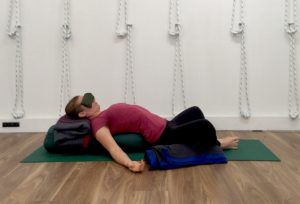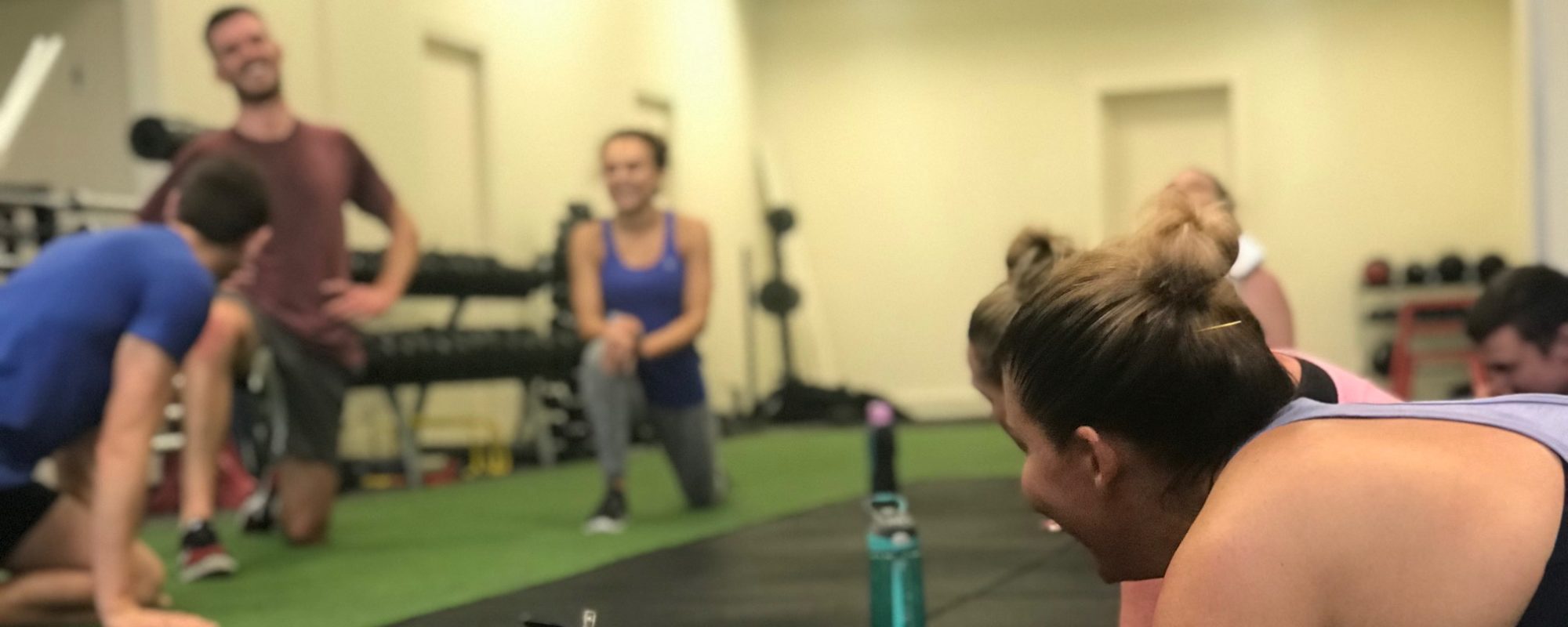
Not the be all and end all.
Just like we need to have a healthy relationship with food, we absolutely need a healthy relationship with exercise.
This post was sparked by a few conversations I’ve had recently about how often we should be exercising. And I would say that the answer is really individual.
For weight loss, a lot depends on diet. And for overall health including weight loss, the answer also has a lot to do with stress. Let me explain.
Case example: *KELLY. Kelly is happy with her weight, people often make remarks about how ‘small’ she is and how she must train all the time. (Disclaimer: *Kelly is actually just me…)
The fact is, I hardly exercise at all and I can’t see that increasing substantially any time soon.
Not that I don’t recommend exercise to my clients! I practice yoga almost every day and my practice is 1-1.5 hours including standing poses, arm balances, backward bends and inversions – i.e. plenty of muscles get challenged in plenty of ways. I do however keep my hand in with the occasional Crossfit competition, a mile of burpees, some Christmas day deadlifts or a 10.5km fun run. (Ok I did the run once last year. But I’m signing up again this year!!) I say Christmas Day deadlifts because after racking my brain that is honestly the last time I did them! Yes I’m serious. Keep reading…
There are a number of factors that influence my weight and my maintenance of strength and fitness.
As I said my yoga practice is anything but sitting and ‘om’ing and gives me a good challenge in mobility, stability, bodyweight strength and endurance.
Secondly, my nutrition is great 80% of the time and I don’t eat a lot. Correct, I don’t eat a lot.
This comes down to three things. Firstly my tendency to eat less under stress.
Second, being in touch with how food makes me feel and therefore largely avoiding foods that make me feel awful.
And lastly, and smirk if you will, but I have an underlying desire to not take more than I need. I’m surely not the only person who as a child tried to post their dinner to the kids in Africa?!
In yoga, this is called aparigraha or ‘non-grasping’. Basically it means defying our modern day desire to have more and more and more and taking only what you need. This can be applied to material things of course, money, cars, clothing, ‘stuff’. But it can equally be applied to eating food. (So can yoga help you lose weight?! Yes!)
When it comes to exercise, I am generally active a lot of the time. I am conscious that sitting down all day makes me tired and my back achy.
I try to see cleaning and other physical duties as opportunities for movement. Our grandparents didn’t do burpees, they just did life and that involved many manual labours that we have machines or the internet for nowadays.
Our ancestors certainly didn’t do burpees either, they spent a great proportion of their time in search of food, hunting and preparing meals for a community of people.
I also love gardening. So for example two days ago I did about 90 minutes of gardening, digging our giant reeds, moving plants, preparing soil and re-planting.
Yesterday I did about two hours of cleaning – vacuuming, bending over to do the skirting boards, mopping floors and getting to the spots that are usually forgotten. I was sweating! That plus my yoga practice I would say is about 3.5 hours of exercise. Not bad!
Lastly, and one of the most important for weight loss, is high-intensity exercise. I say ‘one of’ because most people associate high intensity with fast cardio.
But lifting heavy weights can be high intensity and also a real game-changer particularly for chronic cardio types.
High intensity just means short bursts of near maximal effort and has been show to be superior to long drawn out workouts and lots of cardio for weight loss.
Dr. Doug McGuff says that high-intensity training works by producing a bigger demand on the body quicker and therefore uses up stored glucose in the muscles and liver. This demand can actually last several days after a high intensity workout! In contrast, the extra ‘burn’ of energy after low-intensity exercise is just a few hours.
Functional medicine practitioner Chris Kresser also adds that ‘HIIT (high intensity interval training) also activates hormone-sensitive lipase (HSL), which mobilizes fatty acids for energy use. This means that during HIIT, both glucose and fatty acids will be burned, leading to greater fat loss and restoration of insulin sensitivity.’
So, back to stress.
For someone like myself, who experiences generalised and social anxiety, high intensity exercise is for the most part, too much!
The adrenal glands are only capable of so much and when they reach their threshold they start to lose their ability to bale you out in stressful situations.
A few weeks out from the last Crossfit competition I felt nervous as usual and started trying a few pull ups in an attempt to get my chest up to the bar, an exercise that I knew was in the competition and that I would likely be called on to do. (I didn’t do much else in the way of preparation by the way.)
A few days before the competition I started looking for every excuse to get out of doing it. Difficult when you’re in a team of three!
The night before I felt sick and went to bed early. On the day I ate half a hard-boiled egg first thing in the morning and could hardly stomach anything else all day.
I had abdominal ‘symptoms’ and an overwhelming sense of dread before each workout.
After the first workout was over – a total of 8 minutes shared between 3 people (so not a lot of exercise!), I laid down in the team tent and could hardly get up for about half an hour.
I just had nothing. I was wiped out.
About an hour later my energy picked up and I managed half a banana and the occasional smile if someone tried to talk to me. I repeated the whole thing again twice more that day.
Keep in mind that this competition had over 600 people there, loud music, lots of shouting, people I hadn’t seen in a while, small talk (gasp)… so the social side of my anxiety was getting a damn good challenge as well that day!
Needless to say two weeks later I came down with a flu that gave me huge sweats and fevers two nights in a row. My first cold or flu in 3 years! (I used to get 6 monthly colds when I worked as a vet.)
Anyway, this is just my story and individual needs and I keep myself healthy by taking every opportunity to de-stress that I can, saying no to too many commitments, eating well and regularly, following a night-time unwinding routine, getting good doses of sunshine and nature and practicing yoga.
For a few current clients my story resonates. We need to know that exercise is stress.
But stress in the right amounts is a good thing.
What we need to do is figure out how much stress is appropriate for us at any given time.
There have been times when I’ve been training hard a couple of times a week and felt pretty good, strong and healthy. But now is not one of those times.
The thing that worries me is our obsession with exercise as the machine gun to our weight struggles. Sure it has benefits but our weight and overall health is determined by a fine balance of a number of different aspects of life including nutrition, but absolutely including stress.
As a society we really need to place more significance on stress as it can and will override all our best efforts to lose weight or just be healthy.
Our perception of stress as being just the horrible, life-changing events we have to endure is for the most part inaccurate. Stress is eating too much sugar. Stress is drinking too much alcohol or smoking cigarettes. Stress is not getting enough sleep. Stress is having micronutrient deficiencies from avoiding fats or not getting enough sunshine. Stress is being in a bad relationship. Stress is hating your job day in day out. Stress is being exposed to fluorescent lights for long hours after dark. Stress is sitting down for 8 hours a day. Stress is dealing with all the chemicals and toxins we come into contact with in our modern world. Stress is not having enough fun!
The clients I see who have stalled on their weight loss are largely exercising too much and experiencing huge amounts of stress – without any systems in place to manage that stress. And remember the copious amounts of exercise being added to the mix are just adding MORE stress.
So for those of you hating on yourselves for missing a gym day or believing whole heartedly that you need to train every day to lose weight – my question to you is… is it working?


Hi Kelly, Love this article. I can so relate to everything you say, i have been a student of Alexander Technique, and that has been my saving grace. A mental discipline helping me to be more aware of how to use my body physically and mentally (or mentally and physically!). The mind/body relationship is crucial, as you say. Thanks for the heads up. It is very useful for me at a particularly stressful time preparing for my sister Eileen’s funeral on Monday,
Hi Pat, Sorry I’ve only just seen your message here. I hope everything went well. Look after yourself as best you can xxx